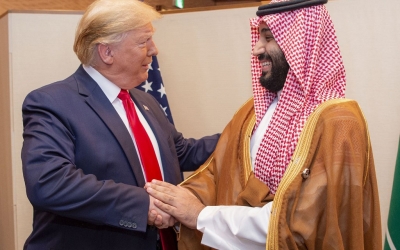Iran's Khamenei accuses US of using sanctions to stoke protests
Iran's Supreme Leader Ayatollah Ali Khamenei accused the United States of trying to stir up anti-government protests by imposing sanctions he said were aimed at bankrupting the country.
Iranian authorities have tried to prevent a revival of the anti-government demonstrations that began last November over economic hardships, but which eventually turned political, with demonstrators demanding top officials step down.
Authorities have said street protests would be dealt with "decisively", and even gave three men involved in the demonstrations death sentences, accusing them "participation in vandalism and arson with the intent to confront and engage in war with the Islamic Republic of Iran".
"Their [the US] short-term goal was to make our people so fed up and tired that they would stand up against the [ruling] system," Khamenei said in a televised speech marking the Muslim religious holiday of Eid al-Adha.
"Their long-term aim is to bankrupt the country, the state, in other words to make the economy collapse."
Stay informed with MEE's newsletters
Sign up to get the latest alerts, insights and analysis, starting with Turkey Unpacked
In addition to the US sanctions, Iran's economy has been hit by falling oil prices, as well as the coronavirus pandemic - Iran has one of the highest Covid-19 death tolls in the Middle East.
Relations between Tehran and Washington have deteriorated since 2018, when US President Donald Trump abandoned Iran's 2015 nuclear deal with six powers, under which Tehran agreed to curtail its nuclear programme in return for the lifting of most international sanctions.
Since the withdrawal, Washington has embarked on a "maximum pressure" campaign, reinstating crippling sanctions on Iranian businesses, individuals and industries.
Khamenei called the US Iran's "main enemy" and ruled out negotiations with Washington, saying Trump would use any dialogue as a means for his own propaganda, as was the case with North Korea's leader, Kim Jong-un.
"At the negotiating table, America wants us to abandon our nuclear industry altogether, reduce our defence capabilities and relinquish our regional influence," he said.
He also accused European signatories of the nuclear deal of "having done nothing" to provide Iran with the economic benefits of the accord, and said their barter system designed to bypass US sanctions was a "useless plaything".
The system, called Instex, is meant to function as a clearing house and allow European companies to deliver medical supplies to Iran without being exposed to sanctions.
The United Kingdom, France and Germany announced they had carried out the first transaction through the mechanism in late June, more than a year and a half after it was established.
Middle East Eye delivers independent and unrivalled coverage and analysis of the Middle East, North Africa and beyond. To learn more about republishing this content and the associated fees, please fill out this form. More about MEE can be found here.





